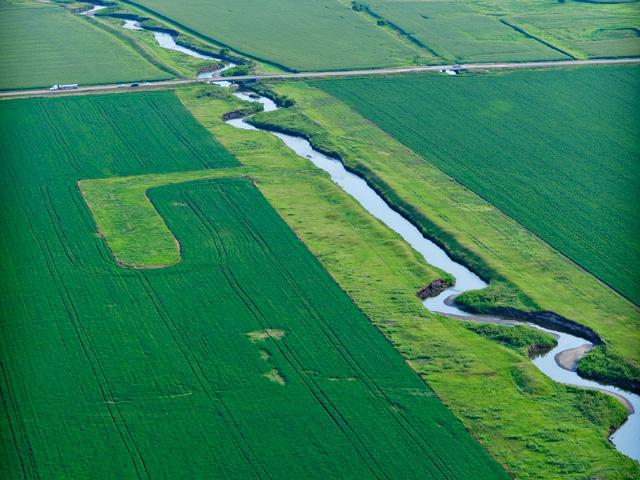Aggies Motion Court to Toss WOTUS Rule
Ag Groups Motion Court to Vacate Biden WOTUS Rule Instead of Issuing Stay
LINCOLN, Neb. (DTN) -- Agriculture groups have asked a federal court to order the Biden administration to implement immediate changes to the waters of the U.S. rule following the Supreme Court's ruling in Sackett v EPA that essentially left the current rule unenforceable.
Among the immediate changes sought in a motion filed by the groups in federal court in North Dakota is for the agencies to apply the Sackett ruling and formally declare ephemeral and isolated waters as no longer jurisdictional.
A preliminary injunction against the WOTUS rule remains in place in 24 states, as ordered by the U.S. District Court for the District of North Dakota. A federal judge in Texas also issued a preliminary injunction in Texas and Idaho.
In Sackett v EPA, the Supreme Court ruled the agency's use of the "significant-nexus" test in making Clean Water Act determinations was unconstitutional. The test is one of two the Biden rule uses to make determinations.
The Biden administration had asked the federal court in North Dakota for a stay in the case, telling the judge the agency plans to issue a rewrite by September.
"Federal defendants assert that a stay will preserve resources because the 'new rule may resolve, or at least narrow, the issues in this case,'" the ag groups led by the American Farm Bureau Federation and the National Cattlemen's Beef Association, said in a motion they are against a stay.
"... Sackett already narrowed the issues in this case," the groups stated in their motion. "Indeed, all five of the categories of WOTUS as defined in the rule are invalid as a result of Sackett's rejection of the agencies significant-nexus test, definition of adjacency to mean having a continuous surface connection and not merely neighboring, adoption of the relatively permanent test from Rapanos, limitation of federal jurisdiction to interstate waters and further limitation of federal jurisdiction to navigable waters."
P[L1] D[0x0] M[300x250] OOP[F] ADUNIT[] T[]
The groups said they have no confidence that any new rule put forward by the EPA and the U.S. Army Corps of Engineers will "fairly account" for the Sackett opinion.
"As the Supreme Court highlighted, federal defendants have 'sought to minimize (prior WOTUS rulings') impact," the ag groups said.
"And businesses have watched federal defendants evade prior WOTUS decisions in SWANCC and Rapanos. The EPA has provided no details to the court on how it will apply Sackett, has given the Corps no direction as to how to apply Sackett and instead has only stated that it plans to issue a new rule by Sept. 1, 2023."
The groups argue that allowing the Biden rule to remain in effect until a new rule is promulgated would put farmers, ranchers and other landowners at "continuing risk of criminal and civil penalties" for "ordinary" use of their property.
Injunctions against the Biden rule are in effect in Alabama, Alaska, Arkansas, Florida, Georgia, Idaho, Indiana, Iowa, Kansas, Louisiana, Mississippi, Missouri, Montana, Nebraska, New Hampshire, North Dakota, Ohio, Oklahoma, South Carolina, South Dakota, Tennessee, Texas, Utah, Virginia, West Virginia and Wyoming.
EPA and the Corps of Engineers have used significant nexus for years. The standard essentially allows regulators to claim jurisdiction over even dryland features if there is scientific evidence of a chemical and biological connection to an actual navigable water such as lakes, streams and rivers.
The Sacketts have filed many appeals on the EPA decision in the past 15 years.
The U.S. Court of Appeals for the Ninth Circuit had sided with EPA's wetland assessment on the Sacketts' property. The court's ruling sends the appeals court decision back to the court for reconsideration.
Justice Samuel Alito said in writing the majority opinion that EPA's interpretation of the law "gives rise to serious vagueness concerns in light of the CWA's criminal penalties."
"Due process requires Congress to define penal statutes 'with sufficient definiteness that ordinary people can understand what conduct is prohibited,'" Alito wrote, "and 'in a manner that does not encourage arbitrary and discriminatory enforcement.' Yet the meaning of 'waters of the United States' under the EPA's interpretation remains hopelessly indeterminate.
"The EPA contends that the only thing preventing it from interpreting 'waters of the United States' to 'conceivably cover literally every body of water in the country' is the significant-nexus test."
Read more on DTN:
"EPA Plans WOTUS Rewrite by September," https://www.dtnpf.com/…
Todd Neeley can be reached at todd.neeley@dtn.com
Follow him on Twitter @DTNeeley
(c) Copyright 2023 DTN, LLC. All rights reserved.






